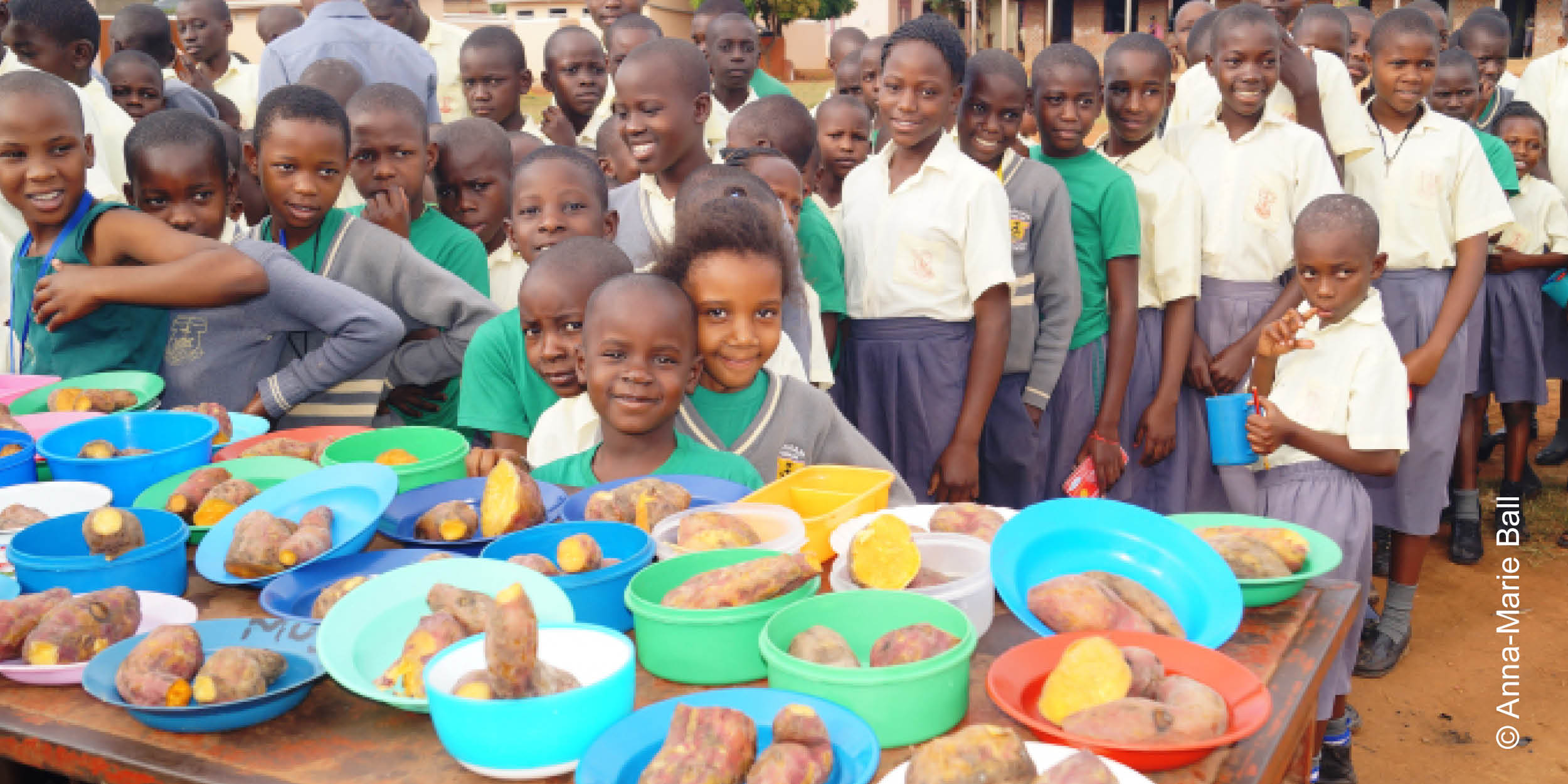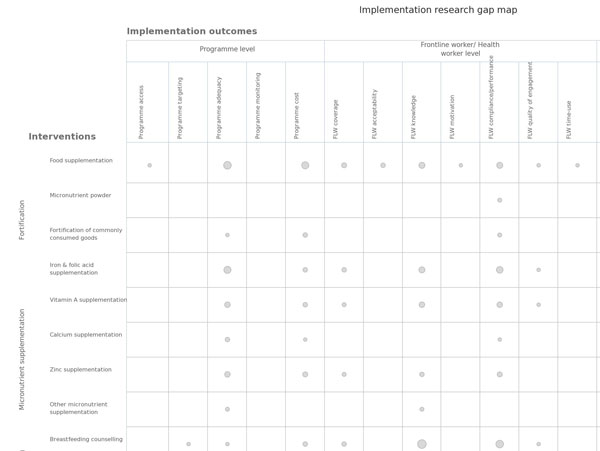Nutrition
Despite best efforts, significant gaps persist between global nutrition targets and actual achievements. These gaps reflect the well-recognised implementation challenge in nutrition – the gap between knowledge of what works and the implementation of proven interventions to achieve coverage and impact at scale. Implementation science and research can help identify and address challenges to implementation. 3ie is working on projects in India, Kenya and Uganda that use implementation science and research.
Project: Strengthening capacity for applying implementation science in Kenya and Uganda
 3ie and the Society for Implementation Science in Nutrition (SISN), with the support of the Bill & Melinda Gates Foundation, are working together to improve implementation and scaling up of anaemia control programmes for women and children in Kenya and Uganda.
3ie and the Society for Implementation Science in Nutrition (SISN), with the support of the Bill & Melinda Gates Foundation, are working together to improve implementation and scaling up of anaemia control programmes for women and children in Kenya and Uganda.
This initiative focuses on improving delivery and uptake of iron and folic acid supplementation (IFAS) in this population through strengthened implementation and by galvanising a coalition of policymakers, programme actors and researchers in both countries. This project also provides the opportunity for policymakers and implementers to learn how to use implementation science through a facilitated process of learning by doing.
Implementation science is a field in which the process is just as important as the outcome
While implementation science is not a new discipline, it is still rapidly developing and evolving. Although relatively well known and used to strengthen health systems, its use in nutrition programmes is just emerging. 3ie’s new project includes providing technical assistance on the concepts of implementation science for nutrition experts and an introduction to nutrition for implementation scientists.
Kenya and Uganda are ideal countries in which to launch this effort. Kenya has taken the lead in many health-related areas, paving the way for other countries. Uganda and Kenya are both Scaling Up Nutrition countries with high anaemia rates. Bottleneck assessments, application of existing evidence and tools, and research designed to answer policy-relevant implementation questions are the primary mechanisms used in implementation science. This project will also be an opportunity for 3ie to find synergies between impact evaluation and implementation research.
Key expected results
- Strengthened capacity for applying implementation science at the country level to address programme implementation challenges and bottlenecks in an appropriate, rigorous, iterative and timely manner.
- Strengthened interaction and knowledge exchange among policy and programme actors and researchers in identifying and addressing bottlenecks in an appropriately rigorous, iterative and timely manner.
- Strengthened implementation of anaemia control programmes and iron and folic acid supplementation for women and children by increased use of emergent findings from implementation research and application of existing knowledge, frameworks and tools in an ongoing manner.
- Increased knowledge at the global level about how to apply implementation science to address challenges and bottlenecks in anaemia control programmes for women and children.
To achieve these goals, 3ie and SISN are collaborating with FHI Partners in Kenya on the NHPplus programme and University Research Co, LLC in Uganda on its RHITES-EC programme.
Webinar: A focused ethnographic study: investigating the barriers to antenatal care attendance to improve iron and folic acid supplementation in Kenya
3ie, the Society for Implementation Science in Nutrition, FHI360-Kenya, and the Kenya Medical Research Institute organised a webinar to discuss novel applications of focused ethnographic (FES) qualitative methods for understanding and addressing barriers within anemia control delivery systems. Gretel Pelto, an expert in the methodology, started with a a brief introduction of the FES approach. This was followed by presentations by the co-principal investigators, Zipporah Bukania, Kenya Medical Research Institute and Brian N Njoroje, FHI360-Kenya, who described the initiative in Kenya, the intervention undertaken to improve IFAS by using the Baby-Friendly Community Initiative and provided an illustrative example by presenting the study and preliminary findings. Watch the full webinar here.
Webinar on study methodology: effectiveness-implementation type III hybrid design
The Society for Implementation Science in Nutrition facilitated a webinar with 3ie grantee, University Research Co. LLC, to discuss how they have adapted the effectiveness-implementation type III hybrid design to improve the delivery of iron-folic acid supplementation (IFAS) program within antenatal care for pregnant women in Uganda. Geoffery Curran, an expert in the methodology, presented the design’s distinctive features and factors for those considering engaging in this kind of research. Nathan Tumwesigye, head of the Uganda country team, presented the programmatic context in which the design is being implemented. Watch the full webinar here.
Inception workshop in Kampala, Uganda
3ie and SISN co-hosted a workshop for country teams from Uganda and Kenya, as well as representatives from the health ministries of both countries. The objective was to foster partnerships between the local teams and facilitate collaboration between them and their health ministry counterparts, understand the project approach clearly, establish guidelines and ways to engage, and collaborate to increase efficiencies among themselves.
Webinar on identifying and addressing bottlenecks within iron and folic acid supplementation programs in Kenya and Uganda
3ie’s grantees under the Implementation Science Initiative in Kenya and Uganda along with our technical partner Society for Implementation Science in Nutrition (SISN) organised a well-attended webinar to share progress and insights on applying the principles of implementation science to improve the delivery of iron and folic acid supplementation programs through antenatal care. The webinar included presentations by country teams on the programme, the bottlenecks identified and the innovative measures that could be taken to address them. Watch the recording here.
Project: Mapping implementation research on nutrition-specific interventions in India

Malnutrition remains one of the biggest health challenges in India. According to the National Health Family Survey (2015-16), over 35 per cent of children under five are underweight, 38 per cent are stunted and 21 per cent suffer from acute undernutrition.
The Integrated Child Development Services programme and the National Health Mission have directed resources towards improving maternal and child health, and the National Nutrition Mission or POSHAN Abhiyaan have been set up to prioritise these efforts. However, understanding on how nutrition-specific programmes are implemented across diverse contexts in India remains limited.
3ie collaborated with the International Food Policy Research Institute (IFPRI) to develop an Implementation Research Gap Map to help identify gaps in implementation research for nutrition-specific programmes in India.
About the map
The map displays existing evidence on nutrition-specific interventions targeted at women and children in the 1000-day window (from a woman’s pregnancy to a child’s second birthday) across a range of implementation outcomes. Food supplementation, fortification, micro-nutrient supplementation, counselling and management of severe acute malnutrition are the primary interventions that are mapped against programme, frontline worker and participant level implementation outcomes.
 The map is a visual, interactive tool for governments and key development partners in the field of nutrition to understand where evidence exists and gaps persist.
The map is a visual, interactive tool for governments and key development partners in the field of nutrition to understand where evidence exists and gaps persist.
View implementation research gap map
What is implementation research?
Implementation research is a systematic approach to recognise and understand implementation bottlenecks and identify optimal strategies for a given setting. It holds the potential to help policymakers unpack why good policy initiatives fail to deliver on the ground.
In this respect, the implementation research gap map systematically searches, consolidates and maps evidence that measures implementation-level outcomes for nutrition-specific interventions in India.
This project is being supported by the International Food Policy Research Institute (IFPRI).